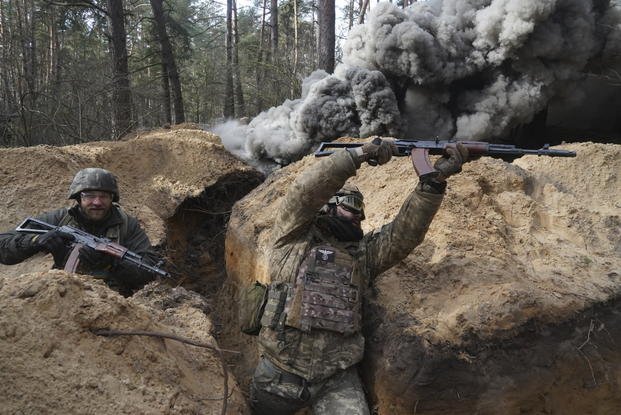The opinions expressed in this op-ed are those of the authors and do not necessarily reflect the views of Military.com. If you would like to submit your own commentary, please send your article to opinions@military.com for consideration.
Saturday, Feb. 24, marked the second anniversary of Russia's unprovoked and illegal invasion of Ukraine. It's a conflict that has completely redefined the intersection of modern warfare and modern media, capturing the attention of the entire world, branding terms like "HIMARS" and "Javelin" into the Western psyche, and turning an unlikely entertainer-turned-president in Volodymyr Zelenskyy into one of the most important ambassadors of freedom in modern history.
The impact of the way the narrative around this war has been shaped and managed cannot be overstated. Of the many lessons communicators and policymakers can take away from the last two years, three specific examples come to mind: one before the invasion, one during, and one from right now.
In the weeks leading up to the invasion, the Biden administration took an enormous communications gamble: It started broadcasting Russian President Vladimir Putin's every move to the American public. At the time, Putin claimed his troop buildups were "purely defensive" and "not a threat to any other country." In a stark response, President Joe Biden called the Russian dictator's bluff, saying he had "every indication" an attack would occur "within the next several days."
And thanks to a fortuitous coming together of government and private industry -- we had before and after imagery to all but prove it. Putin had every opportunity to withdraw his troops and make the American president look like a fool. But Biden was right, immediately defining the West as truthful and the Russians as liars. The administration saw an opening in a hectic message environment, took a calculated risk to occupy that space, and seized immediate control of the narrative. As a result, Putin spent the next year counting his losses and killing his generals in relative silence from an ivory bunker.
In the immediate days following the invasion, the prevailing narrative was one of certain doom. Nearly every media outlet on the planet printed headlines with U.S. officials saying "Kyiv will fall in days." But it didn't. In fact, the opposite happened. The sheer patriotic will of the Ukrainians prevailed, and our digital media platforms showed us everything as it was happening. Drone footage and CCTV cameras caught Ukrainian forces eliminating whole Russian vehicle columns. We saw viral TikTok videos of Ukrainian farmers stealing Russian tanks. We saw memes pop up on Reddit, Twitter and Telegram: Ukrainian Memes Forces, NAFO and (my personal favorite) Saint Javelin. One can hardly say it's a coincidence that the Ukrainians relied so heavily on modern media tactics as part of their war-fighting strategy. They beat the Russians at their own game, empowering their own fighting force and galvanizing the world.
It seems that some lawmakers and members of the media are throwing in the towel for Ukraine. Recently, a high-profile social media personality actually flew to Moscow to create a two-hour puff piece for Putin. Detractors are calling Ukraine's defense "a failure" and "a wasted effort." Yet, here we are, two whole years later, and Ukraine still retains 82% of its territory. Putin has over 800 additional miles of NATO territory on his doorstep, which more than doubles the previous land border. Despite conflicting reports, Russia's military-industrial complex has been badly depleted, and the Ukrainian armed forces have inflicted what that military's leadership estimates is more than 315,000 casualties.
Right now, the war is at a critical turning point. American lawmakers are fiercely debating the next phase of U.S. support for Ukraine -- namely, the $60 billion supplemental package stuck in a congressional tug of war. Media coverage of the war, too, has changed. A recent study showed a precipitous drop in coverage from four major news networks, and Google searches for "Ukraine" have steadily dropped over the last 12 months.
The Ukrainian people cannot rely on courage and bravery alone. So as the conflict moves into year three (and four, and five), it's important to remember that aid comes in many forms -- and Ukraine has never needed it more than right now. Of course, wars are won in the trenches, but it's not all just about dollars and ammo. If we truly have Ukraine's best interest at heart, it needs one of our most powerful weapons -- our attention. It needs our media, our coverage, our content, and our concern. And, yes, even a good meme once in a while doesn't hurt.
-- Andy Oare is the founder of BlueWing Impact, a national security-focused public affairs firm. He was previously the director of digital media for the U.S. Department of Defense.











